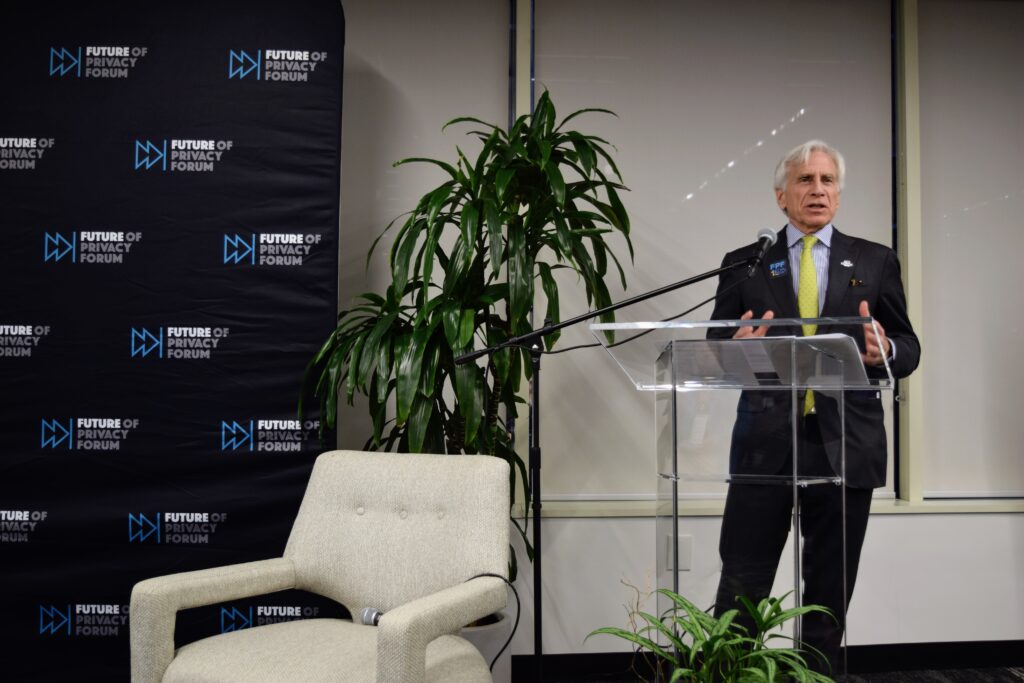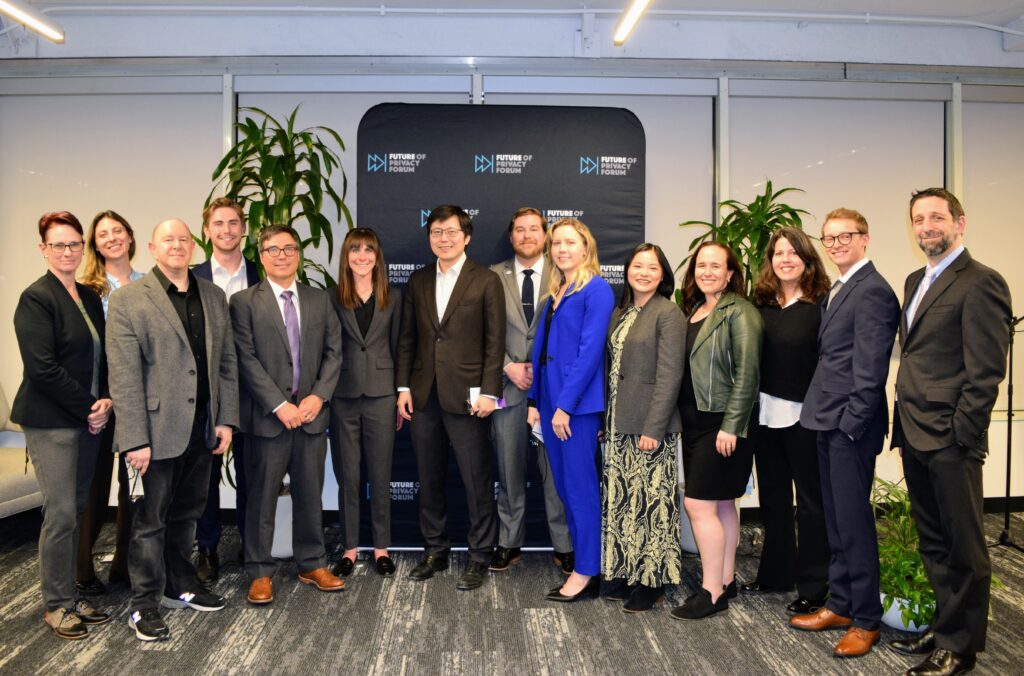FPF Privacy Papers for Policymakers: A Celebration of Impactful Privacy Research and Scholarship
The Future of Privacy Forum (FPF) hosted its 15th Privacy Papers for Policymakers (PPPM) event at its Washington, D.C., headquarters on March 12, 2025. This prestigious event recognized six outstanding research papers that offer valuable insights for policymakers navigating the ever-evolving landscape of privacy and technology. The evening featured engaging discussions and a shared commitment to advancing informed policymaking in digital privacy.

FPF Board President Alan Raul
Daniel Hales, FPF Policy Fellow, kicked off the event as the emcee and recognized the contributions of FPF Board President Alan Raul and Board Secretary-Treasurer Debra Berlyn, along with the FPF staff who helped organize the gathering. Alan Raul, in his opening remarks, emphasized the significance of privacy scholarship and its relevance to policymakers worldwide. He noted that the PPPM event has, for 15 years, successfully brought together scholars, regulators, and industry leaders to discuss privacy research with real-world implications.

Daniel Hales
Lee Matheson, FPF Deputy Director for Global Privacy, opened the discussion by introducing Professor Mark Jia (Georgetown University Law Center), who explored the evolution of privacy law in China. His paper, Authoritarian Privacy, challenges the notion that privacy is solely a Western concept and argues that China’s privacy framework has been shaped not only by state interests but also by public concerns. Professor Jia discussed the role of the Cyberspace Administration of China (CAC) and how privacy regulations have been influenced by social unrest and legitimacy concerns within the government. He emphasized that China’s Personal Information Protection Law (PIPL) is enforceable and not merely symbolic. Their discussion also touched on public “flashpoints” that have prompted government responses and the broader implications for understanding regulatory trends in authoritarian regimes.

Professor Mark Jia and Lee Matheson
Professor Mark MacCarthy (Georgetown University) introduced Alice Xiang (Sony AI) to discuss her paper Mirror, Mirror, on the Wall, Who’s the Fairest of Them All?, which examines algorithmic bias in artificial intelligence models. Ms. Xiang’s research critiques the assumption that fair data sets automatically lead to fair AI outcomes and highlights the challenges in defining fairness. She noted that while engineers often bear the responsibility of addressing bias, broader policy frameworks are needed. Their discussion explored the tension between AI neutrality and the necessity for companies to engage with ethical and social justice considerations. Ms. Xiang argued that AI systems mirror existing societal inequalities rather than solve them and called for stronger regulatory oversight to ensure transparency and accountability in AI decision-making.

Alice Xiang and Professor Mark MacCarthy
Next, Jocelyn Aqua (PwC) conversed with Miranda Bogen (Center for Democracy and Technology), whose paper Navigating Demographic Measurement for Fairness and Equity addresses the paradox of measuring fairness in AI while protecting individuals’ privacy. Ms. Bogen categorized fairness assessment into three key areas: measuring disparities, selecting appropriate metrics, and implementing mitigation strategies. She pointed out that privacy laws like GDPR and CCPA create barriers to demographic data collection, complicating efforts to assess bias in AI systems. The conversation emphasized the need for alternative privacy-preserving methods, such as statistical inference and qualitative analysis, to reconcile fairness assessments with privacy protections. Bogen called for policymakers to establish clearer guidelines that allow for responsible demographic measurement while ensuring compliance with privacy laws.

Miranda Bogen and Jocelyn Aqua
The discussion then turned to Brenda Leong (ZwillGen), who introduced Tom Zick (Orrick, Herrington & Sutcliffe LLP) and Tobin South (Stanford University), two of the co-authors of the paper, Personhood Credentials: Artificial intelligence and the value of privacy-preserving tools to distinguish who is real online. Their paper explores the concept of “personhood credentials,” proposing a decentralized approach to verifying online identities while balancing security and privacy. The authors highlighted the risks posed by AI-driven identity fraud and the need for robust authentication mechanisms that protect user privacy. The conversation covered potential issuers of personhood credentials, including governments and private organizations, and the challenges of industry-wide adoption. Ultimately, the paper argues for the importance of developing privacy-first verification solutions that minimize data exposure while maintaining trust in digital interactions.

Tobin South, Tom Zick, and Brenda Leong
Turning to another critical issue, Professor Daniel J. Solove (George Washington University Law School) discussed his paper (co-authored by Boston University Professor Woodrow Hartzog) The Great Scrape: The Clash Between Scraping and Privacy with Jennifer Huddleston (Cato Institute). Professor Solove examined the legal and ethical complexities of data scraping, arguing that while scraping has long existed in a legal gray area, the rise of AI has heightened privacy concerns. He challenged the perception that publicly available data is free for unrestricted use, noting that privacy laws are evolving to address these issues. The discussion explored potential regulatory solutions, emphasizing the importance of distinguishing between beneficial scraping and harmful practices that exploit personal data. Professor Solove advocated for a public interest standard to determine when scraping should be permissible and called for clearer legal frameworks to protect individuals from data misuse.

Professor Daniel J. Solove and Jennifer Huddleston
In the last discussion, Professor James C. Cooper (Antonin Scalia Law School – George Mason University) joined Professor Alicia Solow-Niederman (George Washington University Law School) to discuss her paper The Overton Window and Privacy Enforcement. Professor Solow-Niederman explained how internal norms, congressional oversight, judicial rulings, and public sentiment collectively shape the Federal Trade Commission’s (FTC) approach to privacy enforcement. The conversation also highlighted recent cases where the FTC has expanded its enforcement scope, including actions against data brokers and algorithmic decision-making. The paper argues that policymakers need to balance their legal authority with the evolving public expectations to ensure effective privacy enforcement.

Professor Alicia Solow-Niederman and Professor James C. Cooper
John Verdi, FPF’s Senior Vice President for Policy, closed the event by thanking the winning authors, discussants, event team, and FPF’s Daniel Hales for their contributions. He highlighted FPF’s role in bringing together academia, policy, and industry experts to promote meaningful discussions on privacy.

Read the 15th Annual Privacy Papers for Policymakers Digest


